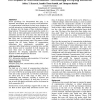Free Online Productivity Tools
i2Speak
i2Symbol
i2OCR
iTex2Img
iWeb2Print
iWeb2Shot
i2Type
iPdf2Split
iPdf2Merge
i2Bopomofo
i2Arabic
i2Style
i2Image
i2PDF
iLatex2Rtf
Sci2ools
CHI
2004
ACM
2004
ACM
Deception and design: the impact of communication technology on lying behavior
Social psychology has demonstrated that lying is an important, and frequent, part of everyday social interactions. As communication technologies become more ubiquitous in our daily interactions, an important question for developers is to determine how the design of these technologies affects lying behavior. The present research reports the results of a diary study, in which participants recorded all of their social interactions and lies for seven days. The data reveal that participants lied most on the telephone and least in email, and that lying rates in face-to-face and instant messaging interactions were approximately equal. This pattern of results suggests that the design features of communication technologies (e.g., synchronicity, recordability, and copresence) affect lying behavior in important ways, and that these features must be considered by both designers and users when issues of deception and trust arise. The implications for designing applications that increase, decrease ...
Author Keywords Deception | CHI 2004 | Everyday Social Interactions | Human Computer Interaction | Instant Messaging Interactions |
Related Content
| Added | 01 Dec 2009 |
| Updated | 01 Dec 2009 |
| Type | Conference |
| Year | 2004 |
| Where | CHI |
| Authors | Jeffrey T. Hancock, Jennifer Thom-Santelli, Thompson Ritchie |
Comments (0)

